Deciding on which home theater projector to put in your house can come down to one little word: “throw.” Long throw, standard throw, short throw, and ultra short throw (UST) are all types of projectors, and they all come down to how much space or distance you need to project an big, beautiful, movie theater-like picture at home.
And while different manufacturers and screen makers vary on the distances needed for each, generally speaking, for a 100-inch image (diagonal), a long- or standard-throw projector could need anywhere from around 8 to 10 feet or more, a short-throw sits around the 3- to 5-foot range, and UST projectors require the least at anywhere between 3 to 20 inches.
Short-throw and UST projectors are often powered by advanced laser lighting technology that offer beautiful 4K resolution and features such as HDR contrast and even some decent built-in sound so you don’t necessarily have to fork over even more cash for a soundbar or sound system.
These projectors are changing the game for people who don’t have big rooms for their home theater setups, and they are becoming much more common and reasonably priced, giving buyers a greater amount of choice than ever.
While UST and short-throw projectors can be pricey, ranging anywhere from $1,000 to more than $6,000, and often require a special ambient light rejecting (ALR) screen, if a big-picture theater at home is what you’re after, a one of these projectors is the way to go. With that in mind, we’ve rounded up the best short throw and ultra short throw projectors on the market right now, hitting a variety of price points.

Image used with permission by copyright holder
Samsung LSP9T Premiere
Best overall UST projector
- 4K picture at 120 inches
- High-quality 2,200-lumen brightness
- Great voice assistant support
Samsung’s ultra short throw projector has an excellent collection of specs that guarantee a high-end home theater experience while also saving a bunch of space. That includes a 2,800-lumen bulb that ensures images will be visible even in bright-room conditions, 4K resolution at up to a 130-inch image size, and Samsung’s own Tizen smart TV platform for browsing apps and more.
This ultra short throw project also comes with 30-watt speakers, and while projector speakers aren’t generally that impressive (we highly suggest getting a full sound system), these plus the built-in subwoofer are better than traditional TV speakers. It’s also a smart projector with support for Alexa, Google Assistant, and Samsung’s own Bixby voice assistant, so you don’t have to get up when you can turn the projector on or search for a show with basic voice commands.
Like many short throw projectors, Samsung’s model is also fairly portable if you’d like to move it to different locations and doesn’t require the same sort of calibration each time that other types of projectors may require. It’s a complete package, although the price may deter some buyers.

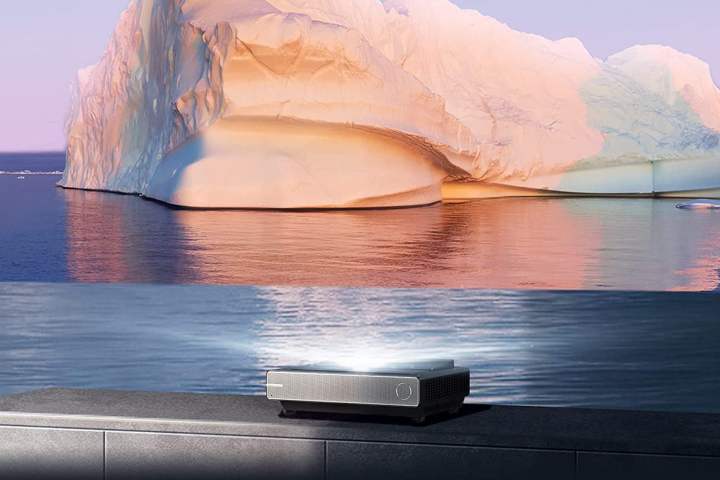
Image used with permission by copyright holder
Hisense PX1-PRO
Best UST for color reproduction
- Great color accuracy
- HDMI eARC support
- Supports casting with Chromecast
- 130-inch images may be too large for some traditional home setups
Hisense’s TriChrome engine is the real highlight of this ultra short throw laser projector, able to reach 107% coverage of the BT.2020 color gamut: that means extra color accuracy, which is always an important consideration for projectors. Combine it with the peak brightness of 2,200 lumens, and you won’t have to worry about losing any image detail if you’re switching from a TV. It also provides a 4K image at up to 130 inches.
We love to see a projector supporting the Dolby Atmos sound format as well. Add in the HDMI eARC support for easy passthrough connections for modern speakers, and this is one of the best projectors for sound quality you can find. Thanks to its Android TV platform, it’s also friendly for Google app users and supports casting video using the Chromecast tools.
If there’s any downside here, it’s that 130 inches is a fairly large space, and you’ll need a lot of room for a screen that large, which may not fit in every home theater space.

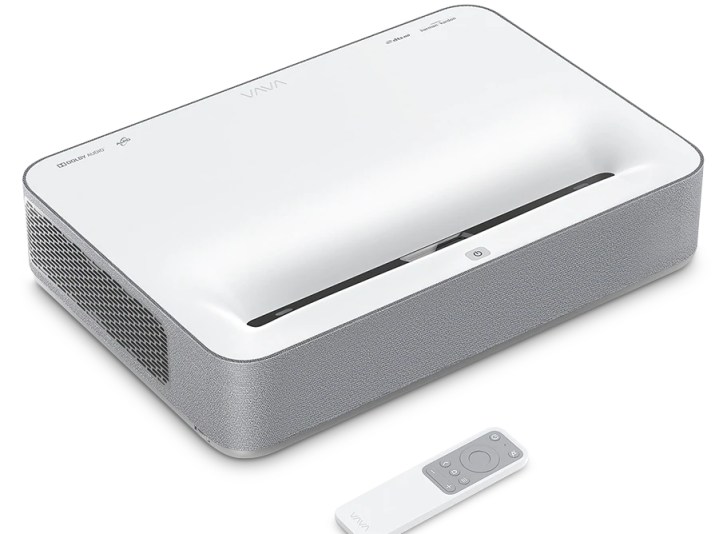
Image used with permission by copyright holder
Vava VA-LT002 Home Theater Projector
Best mid-priced UST projector
- Capable midrange model
- 60-watt Harmon Kardon speakers
- HDR10 support
- Speakers still can’t compete with a full system
Vava’s UST projector is more of a midrange model that allows buyers to save some money without skimping on too many important features. Those features include support for up to a 4K image, a lamp that can reach 1,800 lumens of brightness, and capable 60-watt Harmon Kardon speakers. This is another projector that supports the Android TV platform, which should make managing your streaming services even easier.
We also like to see support for both HDR10 and Dolby Audio here, which will work well if you are primarily interested in a movie-watching experience. It’s another model that’s highly portable, too, so you can easily reposition it or take it to different rooms (classroom, meeting rooms, etc.) if necessary.
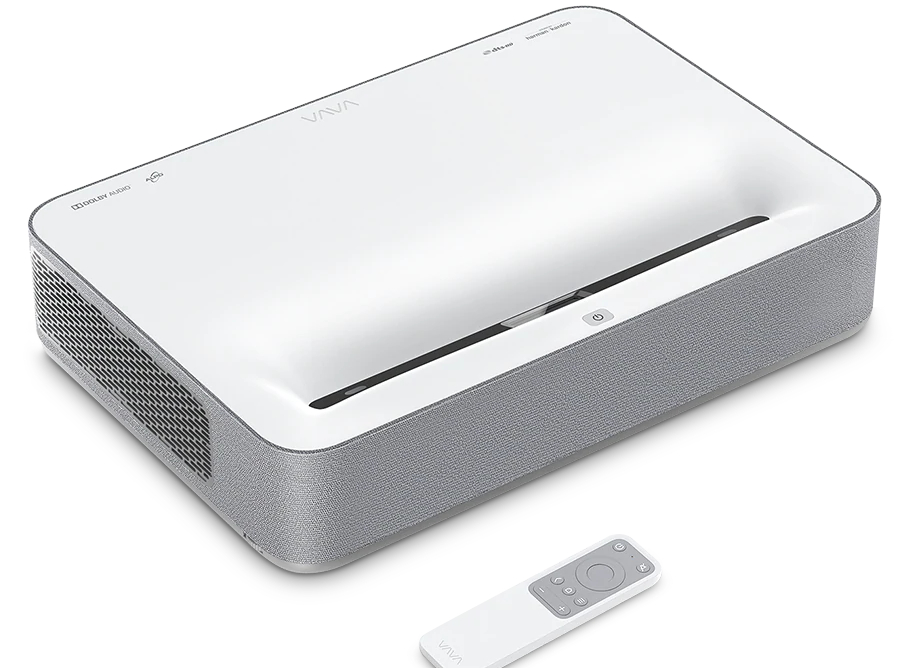
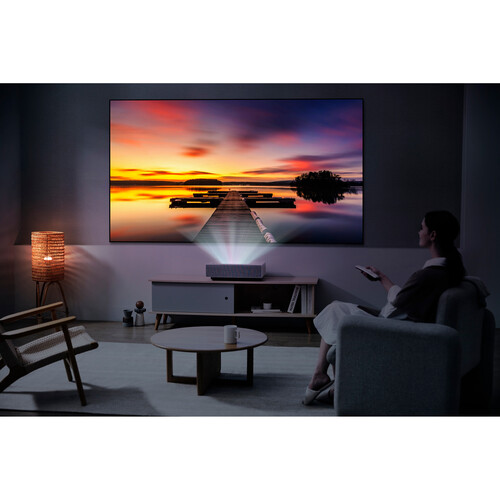
Image used with permission by copyright holder
LG Cinebeam HU715QW
Another great ultra short throw all-rounder
- Dolby Atmos and HDR10 support
- ThinQ smart platform
- Brightness modes depending on the room
- 20-watt speakers do not impress
Combine the impressive 2,500 lumens with 4K technology backed by LG’s XPR tech, add in support for HDR10, and this projector can really deliver an image to make your friends jealous. It’s another model that includes Dolby Atmos and HDMI eARC to benefit your careful speaker setup, too.
The platform also uses LG’s ThinQ smart tech, which means you can give voice commands if you like. Screen sharing is supported via AirPlay 2, Miracast, and more. There are also some handy modes here, including different brightness modes for medium light, bright rooms, dark rooms, and others. Unfortunately, the two 20-watt speakers could be more impressive, so this is another example of why you’d really want an external sound system or soundbar to use as well.

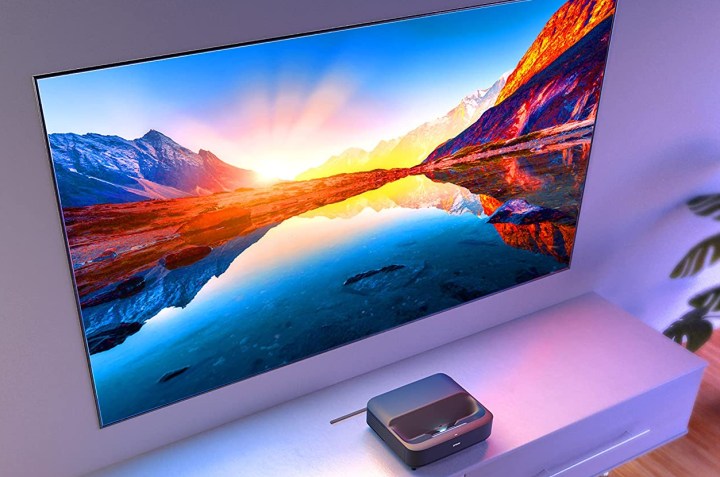
Image used with permission by copyright holder
Epson EpiqVision LS300
Best affordable ultra short throw projector
- Affordable model
- Extra-high 3,600-lumen brightness
- Decent built-in speakers
- Lacks some smart and optimization features
It’s hard to find a budget ultra short throw projector, but Epson’s model will probably be the best you can find. It costs about the same as a very good HDTV, and you get support for up to 4K images at 120 inches, although only native Full HD support (always look at the native support numbers). The laser can reach 100% of the traditional RGB color base, and HDR optimization is here as well for improving contrast and clarity for many kinds of content.
Android TV and its associated support for Chromecast casting are here as well, making this another good pick for Google users or those streaming content from other devices. The Yamaha 2.1 speakers are also very good, considering the price. And brightness is perhaps the most impressive of all, reaching all the way up to 3,600 lumens if necessary (although staying at that level will burn your bulb out quickly). All in all, this is an ideal pick if you want to replace a TV that’s frequently watched in the daytime.

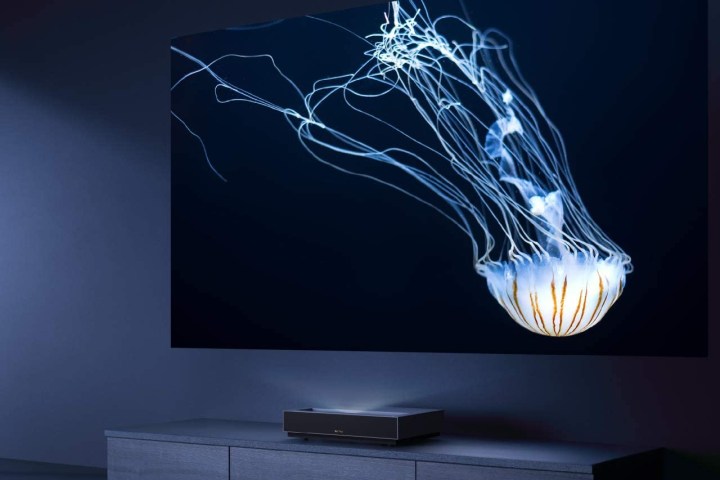
Image used with permission by copyright holder
Wemax Nova 4K Laser Projector
Best big-picture projector for a cinema experience
- Extra-large 150-inch mode
- 3D content support
- HDR10
- More suited toward pure theater rooms than other entertainment spaces
This well-rounded projector does all kinds of things right, starting with 4K support, HDR10, and an extra-large image option that can reach up to 150 inches (although, at that point, your 4K resolution may not be the same). It has a great 2,100-lumen rating that pairs well with ALPD technology that uses light more efficiently to help reduce eye strain at closer distances and save lamp life.
While the main draw here is the support for extra-large images that can easily span a whole wall or home theater room, the broad support of this Wemax model — which also uses Android TV — makes it a good fit for a variety of users. Although if you really want that 150-inch cinematic experience, you may want to break out the measuring tape before you hit the buy button.

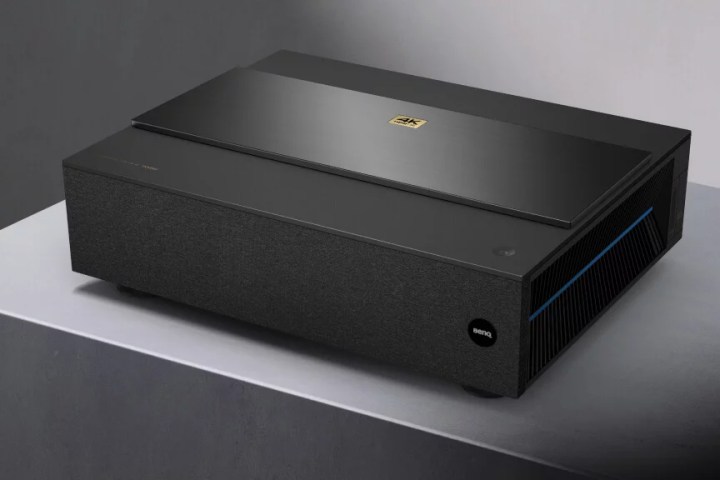
Image used with permission by copyright holder
BenQ V7050i 4K Laser Projector
Great for smart TV features
- Bright 3,500 ANSI Lumens
- HDR-Pro contrast and wide color gamut
- Android TV
- Native sound isn’t great
BenQ makes some excellent projectors, and has done for some time, but the BenQ V7050i is the Taiwanese multinational company’s first laser projector, and it’s safe to say that it’s off to a good start.
First off, the “i” in the product number signifies that it’s among BenQ’s lineup that’s made for streaming services, and the projector’s built-in Android TV platform is the driving force behind delivering all that content. With a bright 2,500 ANSI lumens, this laser projector will be well suited for any bright rooms, and with 98% DCI-P3 color coverage and BenQ’s HDR-Pro technology, it will deliver excellent vivd color with detailed HDR contrast in 4K resolution.
And, of course, it’s an ultra short throw projector, meaning those with smaller spaces or who just don’t want to hang a projector from their ceiling and like to keep it all neat and tidy near the screen, will prefer this setup instead. The V7050i will throw an image up to 100 inches from just 8.7 inches from the screen and can produce a maximum image size of 120 inches.
Sound isn’t awesome on the V7050i, with its dual 5-watt speakers, but who cares. If you’re spending this kind of money, spring for a solid soundbar of even a decent home theater surround sound system that you can connect through the projector’s HDMI ARC output. Lastly, if you like what you see with this model, you might want to hold off and wait for BenQ’s upcoming new V5000i HDR RGB laser projector that we’re eagerly waiting to get our hands on.


Optoma
Optoma GT2100HDR 1080p projector
Best overall short throw projector
- Great color and contrast for the price
- Bright 4,200 ANSI lumens
- Good for gaming and movies
- HDR10 and HLG support
- Built-in speakers aren’t great
If you can’t yet fork over the extra cash for a primo UST projector and you have a little extra room to spare in your viewing room, then the Optoma GT2100HDR short throw projector could be a good option. The GT2100HDR comes from a long model line of well regarded 1080p (1920 by 1080) Optoma projectors that offers a beautiful and bright 2,400 ANSI lumen image from its DLP laser source, for under $1,500.
A great entry-level option for movie lovers and gamers, the Optoma GT2100HDR can throw a 100-inch image onto a screen of wall from just over 3 feet away, up to a maximum of 292 inches diagonal, making backyard movie nights an option (it is not weather resistant, though).
The Optoma GT2100HDR supports HDR10 and HLG HDR formats, so you know the contrast is going to be solid (it may struggle a little in bright rooms, though), and it can reproduce the Rec.709 color gamut, which means vivid and accurate colors no matter what you’re watching. Two HDMI 2.0 inputs means you can connect streaming devices, Blu-ray players, and game consoles, and the projector’s low 8.6 millisecond input response and 120Hz refresh rate, while not mind blowing, will serve gamers well.
Like most projectors in this category, the built-in speakers are not going to win any awards, so we’d recommend adding a soundbar or using your own home stereo setup for sound, which you can connect to through the projector’s 3.5mm output.


BenQ
BenQ X500i 4K gaming projector
Best short throw projector for gamers
- Great price for the features
- Automatically optimizes for your console
- Fast 4.16ms response time
- Dolby Atmos and spatial audio support
- Excellent brightness and color
- HDR10, HDRPro, contrast
- Android TV streaming stick is just OK
If you have limited space in your living room or games room, the BenQ X500i is one of the best-priced and feature-rich short throw projectors you can buy. With a throw ratio of 0.69:1 to 0.83:1, you can game on a screen size of 100 inches with the projector at just five feet away. It’s auto keystone adjustment is great, and will have you up and running fast.
For gamers, the the BenQ X500i is a powerful 4K projector that console gamers will love for its feature that lets you connect any console (such as PlayStation, Xbox, and Nintendo) ad the projector will automatically optimize its settings for the console. The X500i also impresses a fast 4.16ms response time for reduced input lag while killing bad guys, and you can even choose from FPS, RPG, or SPG game modes to further customize the experience. Additionally, you can even use BenQ’s SettingXchange website to access a whole database of projector settings that are perfect for specific games.
But even though this is a great gaming projector, its 2,200 ANSI lumens of brightness, 84% coverage of the DCI-P3 gamut, HDRPro and HDR10 support, and Dolby Atmos and spatial audio sound means that it’s a monster when it comes to watching movies, too. It’s also got Android TV access through an included streaming stick, in case you don’t already have a streaming device to connect. Its two 5-watt built-in speakers aren’t anything to write home about, so a soundbar or a good pair of headphones are a good idea.
The BenQ X500i gaming projector features Wi-Fi, Bluetooth, two HDMI inputs, USB-C and USB-A inputs, as well as Chromecast and AirPlay support. Plus, at just $1,700, it’s a great value for gamers and movie lovers.

Frequently Asked Questions
Throw distance is the minimum/maximum distance the projector can be from a surface (like a screen or a wall) to cast a desirable image. Short throw projectors can generally throw a 100-inch image from roughly 3 to 4 feet from the screen, while ultra short throw projectors tend to have a range anywhere from around 3 to 20 inches.
Brightness is critical for projectors, determining how clear the image will be and how dark the room needs to be to properly see it. Brightness is measured in lumens, though ANSI lumens are a common measure in DLP (digital light processing) projectors.
There isn’t a hard and fast way to measure lumens, so the actual lumen rating can vary from model to model. Generally, the most common brightness for short and ultra short throw projectors is between 2,000 and 2,500 lumens. Portable projectors are usually significantly dimmer, but that’s largely because of the smaller lighting fixture in the compact form factor.
Resolution naturally determines the clarity of the image. This is measured the same way it is on televisions and monitors. It’s important to read the fine print when shopping for projectors, however. Many will boast 4K or 1080p resolutions but are referring to the content the projector supports — different than the projector’s native resolution. Many cheaper projectors will promote HD resolutions but only have a native resolution of 840 × 480 (DVD quality).
Any time you’re shopping, check the native resolution to get a clear idea of what the image will look like.
Projectors these days usually come with a healthy number of ports to connect Blu-ray players, gaming consoles, and streaming devices. These are usually critical, even if the projector has a built-in smart TV interface, such as Google TV or Android TV. These interfaces are usually clunky and outdated, so you’ll always have a better experience connecting an external media device.
You will also want to make sure the projector has audio-out jacks or HDMI eARC. Projector speakers are usually weak, if they have speakers at all. To get the best experience, you’ll want to connect a soundbar or home theater system.
If you want to go wireless, some projectors do support AirPlay or Chromecast, though this is far from a universal feature. But you can make just about any projector cast video by connecting an Apple TV, Chromecast, or another streaming stick.
That all depends on what your needs are, but compared to regular throw projectors, short throw and UST projectors are easier to set up as they do not require as much room to throw an image and can be more conveniently placed much closer to the screen, often on your existing media console.
Because of this closer setup, there’s no worry about people walking in front of the projection beam casting a shadow and ruining your viewing, and there’s no need for often messy or intrusive ceiling mounting. Picture-wise, however, the fact that it’s a short throw or UST projector doesn’t determine its picture quality — normal throw and UST projectors can have similar resolution and picture quality specs.
No, you don’t need a screen with a short throw or UST projector, or with any projector for that matter, and you can simply project an image on to a clean and smooth white wall, if you like.
However, adding a proper screen will improve the picture quality immensely. But not all screens are created equal and some might be better for the projector you buy and the room situation you’re in as some screens do better at managing the light in the room, especially if your projector isn’t set up in a dedicated home theater room, like in a basement or where the light can be completely controlled. Some UST projectors actually will come with a perfectly paired screen, such as an “ambient light reflecting” (ALR) screen that does a much better job of filtering and reflecting light for brighter, clearer, more vivid picture quality.
Yes, of course! Many projectors, not just UST projectors, come with HDMI inputs that can be used to connect your streaming devices such as an Apple TV, Roku, or Amazon Fire Stick, just as you would with a TV. Some are even capable of 4K resolution and HDR features like Dolby Vision and DTS:X, as well as sound support for formats such as Dolby Atmos. A lot of projectors are also now coming with built-in smart TV operating systems such as Android TV, webOS, and Tizen, that all support every streaming service you can think of.
Editors’ Recommendations
This post was originally published on Digital Trends




